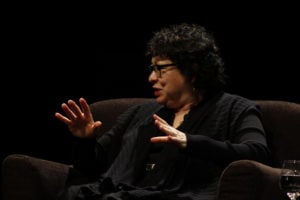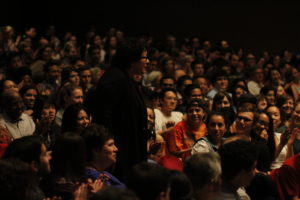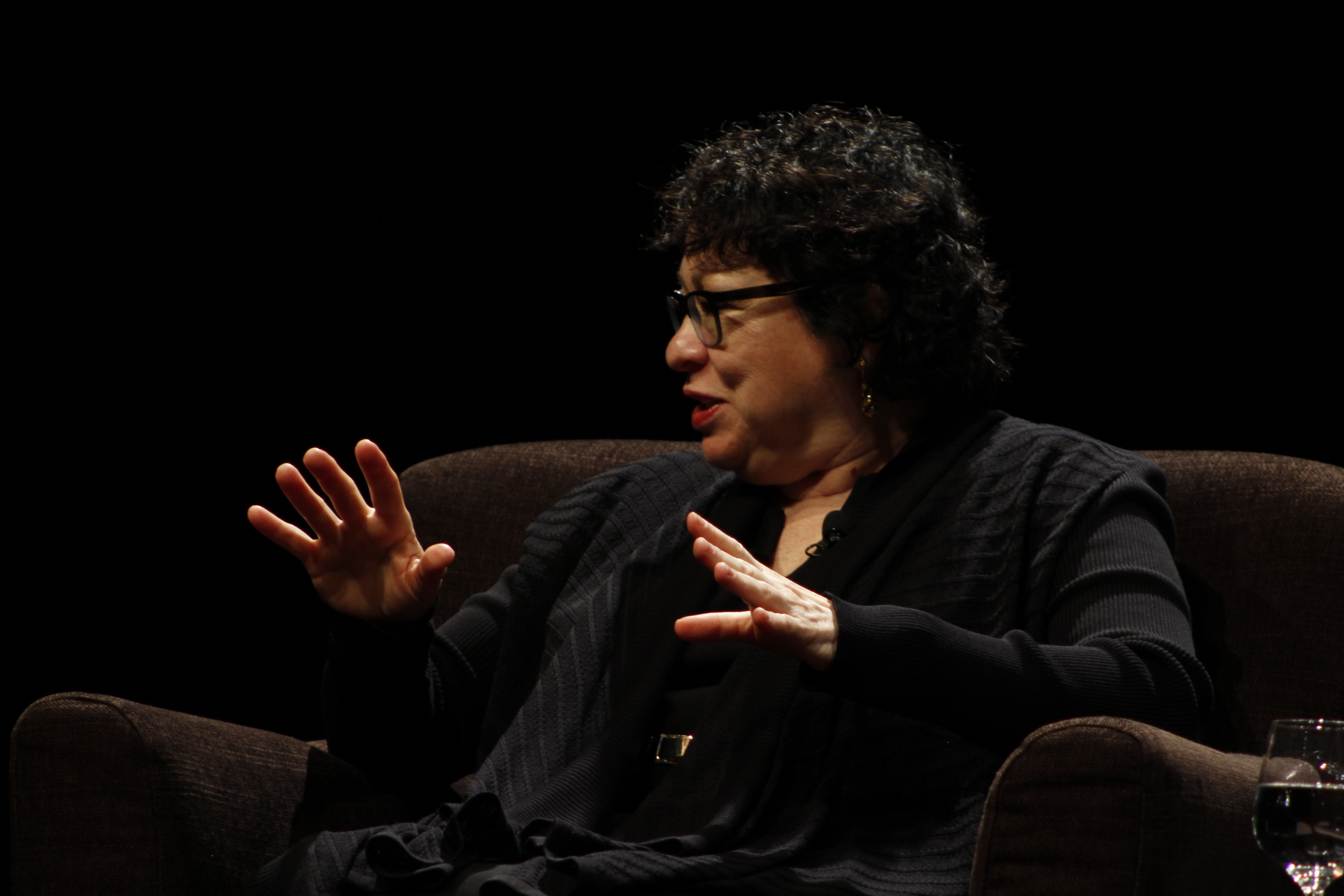Sonia Sotomayor, associate justice of the United States Supreme Court, spoke Friday afternoon at Memorial Auditorium about the importance of seeking education, addressing opposing viewpoints, and remaining connected to one’s culture and background.
Sotomayor started the event in conversation with M. Elizabeth Magill, dean of Stanford Law School and Richard E. Lang Professor of Law. She left the stage for the second half of the event, walking through the audience and shaking hands as she answered students’ questions.

As President Marc Tessier-Lavigne welcomed Sotomayor to the stage, the audience met the justice with a standing ovation, setting the tone for the rest of the event.
“You touch my heart,” Sotomayor said.
Magill opened the conversation with a question about Sotomayor’s educational pursuits. Sotomayor explained that she did not always value education; after her father’s death in fourth grade, though, she “used books to escape the sadness.”
“Books gave me the wonderful opportunity to learn something new,” Sotomayor said. “I understood the power of education then. Education opens you inside and out, and learning opens the world and opens you to greater opportunity.”
As an undergraduate at Princeton University, Sotomayor took a number of introductory classes in multiple disciplines, and she urged Stanford students to be intellectually curious and do the same.
“I figured out first how to be a generally informed citizen before I tried to be a specialist in anything else,” Sotomayor said. “Curious people go further; it is curiosity that leads you to experience new things.”
Magill also asked Sotomayor how she addressed perspectives that oppose her own. Sotomayor stressed the importance of respecting the passion and good intent of others.
“Don’t start thinking that the other side has no basis for their feelings,” Sotomayor said. “There is something in what they’re saying to you about their views, their needs … that has justification.”
For Sotomayor, this idea lays the foundation for persuading someone to understand your own views and reaching fair decisions. She contextualized her advice while discussing the Supreme Court.
“I respect every one of my colleagues,” Sotomayor said. “We all work equally hard to get the answers right. We disagree, not infrequently, with how to do that, but not from mal-intent. It’s always from the good intent of believing fiercely that the right answer is what the country needs.”

As Magill turned the conversation over to questions from students, Sotomayor left the stage to walk amid the audience.
“I think being among you engages you more,” she explained.
One student asked Sotomayor about her hopes or fears as she took the position of Supreme Court justice.
Her biggest fear: “Would I be good enough?”
However, Sotomayor explained that her insecurity motivated her to work tirelessly during her first three years on the court, reading as much as possible to prepare herself for the role.
“If you have a new experience, and you’re not a little scared, you’re conceited,” Sotomayor advised. “You’re likely to get something really wrong.”
In addition, Sotomayor spoke on the importance of using your own measures of success, not others’, as “there is no one definition of success.” She urged students to continuously ask themselves what they want do and how they can “grow each day one step at a time.”
Students also asked the justice about her experience moving from the Bronx to an elite university while remaining connected to her culture and roots. One audience member asked about the discrimination Sotomayor faced as a Latina. While Sotomayor explained that “discrimination will always exist,” she urged students to use their judgement and take proper action against prejudice.
Sotomayor also advised students that, in order to reach across barriers, it is important to stay connected with others and learn about others’ communities.
“When you come from a different culture, you can’t denigrate [others’] cultures or your own culture,” Sotomayor explained. “You have to take the time to learn about others’ lives.”
Discussing her personal road to success, she noted that she did not make it alone to where she is today.
“My greatest accomplishment is that I haven’t traveled the road of success by myself — my family has been with me every step of the way,” Sotomayor said. “I encourage students to use resources today such as Skype to talk to your parents about what you are experiencing. You are your family, and they are you.”
Many students said they found Sotomayor an inspiration.
“It was so great to see her being herself and commanding the stage,” said audience member Cenobio Hernandez ’17.
Karen Oropeza ’17 agreed with Hernandez, adding, “[Sotomayor] was unapologetically herself. She’s very humble and inspiring for women and minority students.”
Second-year law student Shizuka Tiernan said she learned much from Sotomayor’s personal experiences: specifically, her anecdote about disagreeing with other justices and about recognizing the validity of others’ feelings.
In closing, Magill presented Sotomayor with a “Fear the Nerds” Stanford shirt. Sotomayor responded by giving Stanford students one last piece of advice.
“Take pride in being nerds,” she said.
Contact Tia Schwab at kbschwab ‘at’ stanford.edu and Aparna Verma at averma2 ‘at’ stanford.edu.
